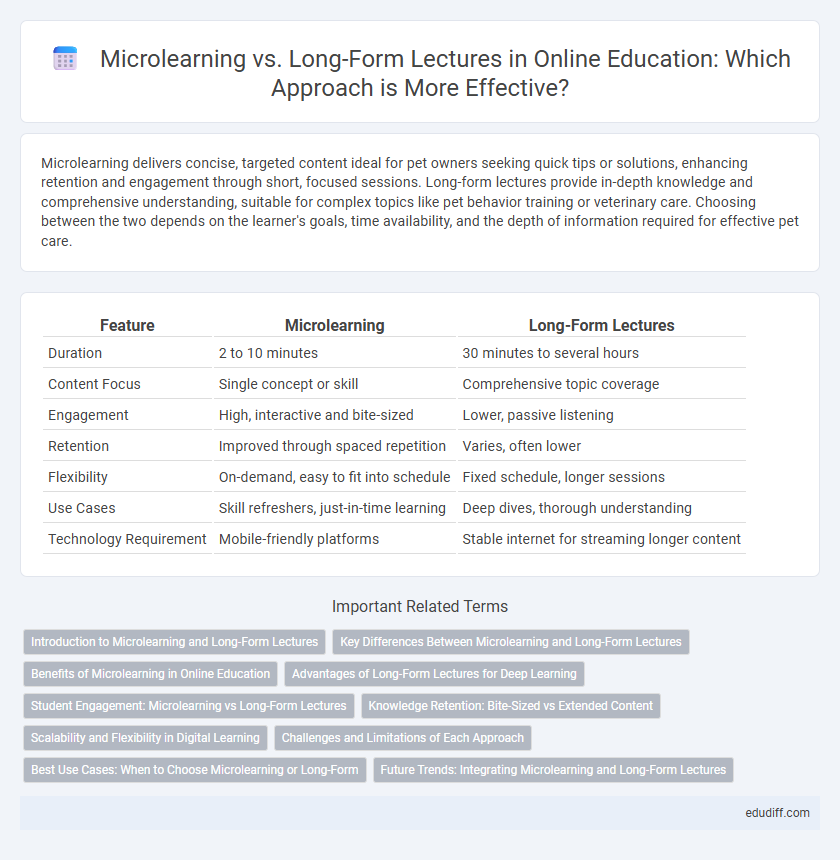Microlearning delivers concise, targeted content ideal for pet owners seeking quick tips or solutions, enhancing retention and engagement through short, focused sessions. Long-form lectures provide in-depth knowledge and comprehensive understanding, suitable for complex topics like pet behavior training or veterinary care. Choosing between the two depends on the learner's goals, time availability, and the depth of information required for effective pet care.
Table of Comparison
| Feature | Microlearning | Long-Form Lectures |
|---|---|---|
| Duration | 2 to 10 minutes | 30 minutes to several hours |
| Content Focus | Single concept or skill | Comprehensive topic coverage |
| Engagement | High, interactive and bite-sized | Lower, passive listening |
| Retention | Improved through spaced repetition | Varies, often lower |
| Flexibility | On-demand, easy to fit into schedule | Fixed schedule, longer sessions |
| Use Cases | Skill refreshers, just-in-time learning | Deep dives, thorough understanding |
| Technology Requirement | Mobile-friendly platforms | Stable internet for streaming longer content |
Introduction to Microlearning and Long-Form Lectures
Microlearning delivers content in short, focused bursts, enhancing retention through targeted, easily digestible modules that fit modern learners' busy schedules. Long-form lectures provide comprehensive, in-depth exploration of topics, ideal for deep understanding but requiring sustained attention and time commitment. Both methods serve distinct educational goals, with microlearning optimizing quick knowledge acquisition and long-form lectures facilitating detailed mastery.
Key Differences Between Microlearning and Long-Form Lectures
Microlearning delivers concise, focused content in short bursts, enhancing retention and engagement by catering to limited attention spans. Long-form lectures provide comprehensive, in-depth exploration of subjects, ideal for complex topics requiring detailed understanding and critical analysis. Microlearning prioritizes flexibility and quick knowledge application, whereas long-form lectures emphasize thorough conceptual mastery and extended interaction.
Benefits of Microlearning in Online Education
Microlearning enhances online education by delivering concise, focused content that increases learner engagement and retention through bite-sized modules. Its flexibility allows learners to access material anytime, improving knowledge assimilation and accommodating diverse schedules. The format supports faster skill acquisition and immediate application, making it ideal for continuously evolving digital learning environments.
Advantages of Long-Form Lectures for Deep Learning
Long-form lectures provide comprehensive coverage of complex subjects, allowing learners to engage in detailed explanations and nuanced discussions essential for deep learning. Extended sessions foster critical thinking by enabling connections between concepts and encouraging in-depth analysis. This format supports better retention and mastery of material, particularly in academic and professional fields requiring thorough understanding.
Student Engagement: Microlearning vs Long-Form Lectures
Microlearning enhances student engagement by delivering concise, focused content that aligns with attention span limits and promotes active recall. Long-form lectures risk causing cognitive overload and reduced retention, often leading to passive learning and distraction. Studies show microlearning increases participation rates and improves knowledge retention compared to extended lecture formats.
Knowledge Retention: Bite-Sized vs Extended Content
Microlearning delivers information in concise, bite-sized modules that enhance knowledge retention through focused repetition and reduced cognitive overload. Long-form lectures, while comprehensive, may overwhelm learners with extended content leading to decreased attention and memory recall. Studies show that microlearning's segmented approach significantly boosts retention rates compared to traditional lecture formats.
Scalability and Flexibility in Digital Learning
Microlearning offers superior scalability by delivering concise, modular content that can be rapidly updated and distributed across diverse digital platforms, ensuring consistent learner engagement. Long-form lectures, while comprehensive, often require more resources and time for production and adaptation, limiting their flexibility in dynamic online environments. Emphasizing microlearning enhances digital learning adaptability, catering to varied learner paces and device compatibilities.
Challenges and Limitations of Each Approach
Microlearning often faces challenges such as limited depth and context, making it difficult to cover complex subjects thoroughly, while long-form lectures can lead to cognitive overload and reduced learner engagement over extended periods. Microlearning's bite-sized format may hinder deep knowledge retention and critical thinking development, whereas long-form lectures demand sustained attention, which can result in lower information absorption and increased dropout rates. Both approaches require strategic instructional design to balance content complexity with learner attention spans and retention goals.
Best Use Cases: When to Choose Microlearning or Long-Form
Microlearning is best suited for just-in-time training, skill reinforcement, and bite-sized information delivery, ideal for learners with limited time or needing quick refreshers. Long-form lectures excel in comprehensive subject exploration, in-depth theory explanation, and complex topic coverage requiring extended focus and detailed understanding. Choosing between microlearning and long-form depends on instructional goals, learner engagement, and content complexity, maximizing learning effectiveness by aligning format with objectives.
Future Trends: Integrating Microlearning and Long-Form Lectures
Future trends in online education emphasize the integration of microlearning modules with long-form lectures to enhance learner engagement and retention. Combining concise, targeted content with in-depth explorations allows for customized pacing, catering to diverse learning preferences and improving knowledge application. Emerging platforms leverage AI-driven analytics to seamlessly blend these formats, optimizing educational outcomes and fostering lifelong learning.
Microlearning vs Long-form lectures Infographic

 edudiff.com
edudiff.com